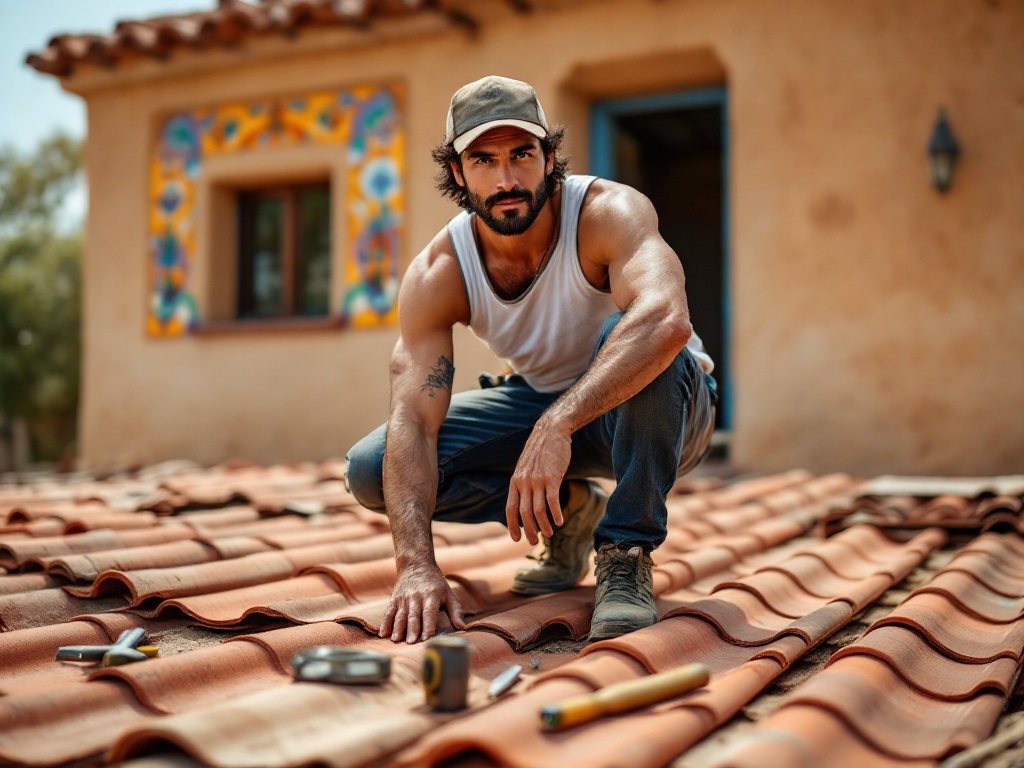
Introduction: The Importance of Roof Maintenance in Jacksonville Beach
Living in Jacksonville Beach, Florida, means enjoying sun-soaked shores and vibrant coastal living, but it also comes with unique challenges for your home’s roof. In Duval County’s coastal environment, roofs face relentless salt air, high humidity, intense UV exposure, and the ever-present threat of hurricanes. For homeowners near the Jacksonville Beach Pier or along Atlantic Boulevard, maintaining your roof isn’t just about upkeep—it’s about protecting your property, preserving its value, and avoiding costly repairs. A well-maintained roof ensures your coastal home remains a safe haven against Northeast Florida’s harsh elements.
Jacksonville Beach’s climate, marked by 50+ inches of annual rainfall and hurricane risks like Hurricane Ian in 2022, demands proactive roof maintenance. Salt air corrodes materials, high winds lift shingles, and humidity fosters mold, all of which can shorten your roof’s lifespan if neglected. Without regular care, minor issues like leaks or rust can escalate, leading to expensive replacements that strain your budget. For instance, a small leak in a beachfront home near Oceanfront Park can damage interior structures, costing thousands to repair. Proper maintenance extends your roof’s life, boosts energy efficiency, and enhances curb appeal, critical in Jacksonville Beach’s competitive real estate market.
The unique coastal lifestyle of Jacksonville Beach adds further complexity. Homes in South Jacksonville Beach or Pablo Creek often feature architectural styles like Mediterranean or modern coastal, requiring roofing materials that balance aesthetics with durability. Salt air from the Atlantic Ocean, especially near 3rd Street South, accelerates wear on metal components or asphalt shingles, demanding vigilant care. Homeowners in upscale communities face HOA regulations, mandating specific materials or colors to maintain neighborhood charm. Meanwhile, the area’s tourism-driven economy means a well-maintained roof can boost rental or resale value, appealing to visitors and buyers alike.
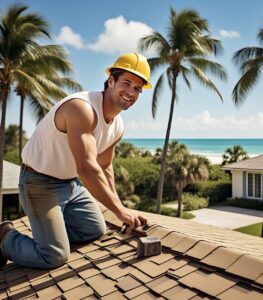 Economically, roof maintenance is a wise investment. In Duval County, a durable roof can qualify for insurance discounts, as insurers reward hurricane-resistant upgrades, especially after storms like Ian. Reflective roofs, common in Jacksonville Beach, reduce cooling costs in 90°F summers, saving hundreds annually. Regular care also prevents unexpected expenses, preserving your budget for enjoying coastal amenities like Seawalk Pavilion events. By prioritizing maintenance, you safeguard your home’s structural integrity and financial value in Florida’s salty, stormy climate.
Economically, roof maintenance is a wise investment. In Duval County, a durable roof can qualify for insurance discounts, as insurers reward hurricane-resistant upgrades, especially after storms like Ian. Reflective roofs, common in Jacksonville Beach, reduce cooling costs in 90°F summers, saving hundreds annually. Regular care also prevents unexpected expenses, preserving your budget for enjoying coastal amenities like Seawalk Pavilion events. By prioritizing maintenance, you safeguard your home’s structural integrity and financial value in Florida’s salty, stormy climate.
This guide offers practical tips for maintaining coastal roofs, tailored to Jacksonville Beach homeowners. From inspections to material-specific care, we’ll cover everything you need to keep your roof durable against Duval County’s salty, stormy conditions. Whether you own a beachfront bungalow or a modern home in South Jacksonville Beach, you’ll find actionable advice to protect your investment. Trust a local Jacksonville Beach roofing contractor, like Custom Roofing Solutions, to guide you through the process with expertise in coastal challenges.
Our team at Custom Roofing Solutions understands the nuances of maintaining roofs near Neptune Beach or Ponte Vedra Beach, ensuring compliance with local codes and long-lasting results. Let’s explore how to maintain your coastal property’s roof for long-lasting performance and peace of mind, keeping your home ready for Florida’s toughest conditions.
Understanding Jacksonville Beach’s Coastal Climate Challenges
Jacksonville Beach’s coastal climate is both a blessing and a challenge for homeowners in Duval County. With its humid subtropical environment, the area experiences 70–90% humidity, over 50 inches of annual rainfall, and temperatures ranging from 50°F in winter to 90°F in summer. Located along the Atlantic coast, Jacksonville Beach faces unique roofing challenges: salt-laden air, high winds, intense UV exposure, and hurricane risks. Understanding these factors is key to maintaining a durable roof near landmarks like the Jacksonville Beach Pier or neighborhoods like South Jacksonville Beach.
Salt air is a primary concern, especially for homes near the ocean or 3rd Street South. It accelerates corrosion of metal roofing components, fasteners, and flashing, weakening structural integrity. High winds, often exceeding 100 mph during storms like Hurricane Ian in 2022, can lift shingles, crack tiles, or dislodge debris, causing significant damage. The constant UV radiation fades materials and degrades sealants, while humidity fosters mold and mildew, particularly on asphalt shingles. Sand and seaweed, blown inland from Jacksonville Beach’s shores, accumulate on roofs, clogging gutters and promoting water pooling.
These conditions lead to common roofing issues: leaks from worn underlayment, rusted metal surfaces, algae growth, and cracked tiles from debris impact. For example, homes near Neptune Beach or Ponte Vedra Beach often see accelerated wear due to salt exposure. Without proper maintenance, these issues can escalate, requiring costly repairs or premature roof replacement. By prioritizing coastal roofing maintenance, Jacksonville Beach homeowners can mitigate these risks, ensuring their roofs withstand Duval County’s harsh environment. The next section explores how regular maintenance saves money and protects your coastal property long-term.
Why Regular Roof Maintenance Saves Jacksonville Beach Homeowners Money
Regular roof maintenance is a smart investment for Jacksonville Beach homeowners, offering significant cost savings and protecting your coastal property in Duval County. The salty, stormy environment near the Jacksonville Beach Pier demands proactive care to prevent minor issues from becoming major expenses. By maintaining your roof, you can extend its lifespan, boost property value, and even lower insurance and energy costs.
Neglecting maintenance in Jacksonville Beach’s harsh climate can lead to costly repairs. A small leak, left unchecked, can damage insulation or framing, costing thousands to fix. Salt corrosion, common in homes near Oceanfront Park, weakens metal components, requiring expensive replacements if not addressed early. Regular maintenance—such as cleaning algae or securing shingles—prevents these issues, saving you from premature roof replacement, which can cost $10,000–$30,000 depending on materials.
A well-maintained roof also enhances property value in Jacksonville Beach’s competitive real estate market. Coastal homes with durable, attractive roofs stand out, attracting buyers in areas like South Jacksonville Beach or Pablo Creek. Additionally, insurers in Duval County often offer discounts for hurricane-resistant roofs, rewarding homeowners who maintain impact-resistant materials like metal or tile. For example, after Hurricane Ian’s 2022 impact, maintained roofs qualified for better rates than damaged ones.
Energy efficiency is another benefit. Clean, reflective roofs reduce cooling costs in Jacksonville Beach’s 90°F summers, saving hundreds annually. Maintenance ensures coatings and insulation perform optimally, lowering your AC bills. By investing in routine care, you protect your home, save money, and enjoy peace of mind in Florida’s coastal climate. The next section shares essential inspection tips to keep your roof in top shape.
Essential Roof Inspection Tips for Jacksonville Beach Properties
Regular roof inspections are critical for Jacksonville Beach homeowners to maintain coastal properties in Duval County’s salty, storm-prone environment. Inspecting your roof twice a year—before and after hurricane season (June–November)—helps catch issues early, preventing costly repairs. For homes near the Jacksonville Beach Pier or South Jacksonville Beach, here’s how to inspect your roof effectively.
Start by checking for visible damage. Look for loose or missing asphalt shingles, cracked clay or concrete tiles, or rusted metal panels, common after high winds in Jacksonville Beach. Inspect flashing around chimneys, vents, and skylights for corrosion, as salt air near 3rd Street South accelerates rust. Check gutters for sand or seaweed debris, which can clog drainage and cause water pooling. Algae or mildew growth, prevalent in Duval County’s 70–90% humidity, appears as dark streaks on shingles and requires cleaning.
Coastal-specific issues include salt buildup on metal roofs or fasteners, which can weaken structural integrity. Examine seams and seals for UV-induced cracking, as Florida’s intense sun degrades materials over time. If your home is near Neptune Beach, watch for sand abrasion on tiles or shingles, which erodes surfaces. Use binoculars for a safe initial inspection, but avoid climbing onto high or steep roofs, especially in Jacksonville Beach’s windy conditions.
For safety and thoroughness, hire a professional Jacksonville Beach roofing contractor. They’re trained to spot hidden damage, like underlayment wear or subtle leaks, and ensure compliance with Duval County’s 130 mph wind codes. Local roofers understand coastal challenges, offering tailored advice for homes near Atlantic Beach. Regular inspections keep your roof durable, saving you from unexpected repairs in Florida’s tough climate.
Cleaning Your Roof: Combating Salt, Algae, and Debris
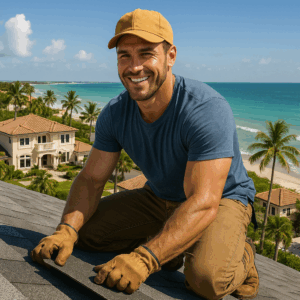 Cleaning your roof is a vital maintenance task for Jacksonville Beach homeowners, protecting coastal properties from salt, algae, and debris in Duval County’s humid environment. Regular cleaning prevents corrosion, extends roof lifespan, and maintains energy efficiency, especially for homes near the Jacksonville Beach Pier or South Beach Park.
Cleaning your roof is a vital maintenance task for Jacksonville Beach homeowners, protecting coastal properties from salt, algae, and debris in Duval County’s humid environment. Regular cleaning prevents corrosion, extends roof lifespan, and maintains energy efficiency, especially for homes near the Jacksonville Beach Pier or South Beach Park.
Salt air, a constant in Jacksonville Beach, deposits corrosive particles on metal roofs, fasteners, and flashing. Rinse these surfaces quarterly with a garden hose to remove buildup, particularly for homes along 3rd Street South. Algae and mildew thrive in Duval County’s 70–90% humidity, creating dark streaks on asphalt shingles or tile roofs. Use a low-pressure washer with a biodegradable cleaner to remove growth, avoiding high-pressure methods that damage materials. Sand and seaweed debris, blown inland from Jacksonville Beach’s shores, clog gutters and promote water pooling, so clear them regularly.
For asphalt shingles, focus on algae removal to prevent surface degradation. Metal roofs require rinsing to maintain corrosion resistance, while tile roofs need debris cleared to avoid cracks. Coastal homes near Oceanfront Park face heavier sand accumulation, requiring more frequent cleaning. Schedule cleanings quarterly, especially after storms, to combat Jacksonville Beach’s unique debris challenges.
DIY cleaning is suitable for low, accessible roofs, but steep or multi-story homes require professional Jacksonville Beach roofing contractors. They use safe, effective methods to protect your roof and ensure compliance with local codes. Professional cleaning also preserves reflective coatings, reducing cooling costs in Florida’s 90°F summers. By keeping your roof clean, you safeguard your coastal property’s durability and appearance in Duval County’s harsh climate.
Repairing Common Coastal Roof Damage in Jacksonville Beach
Coastal roofs in Jacksonville Beach face unique damage from salt air, high winds, and UV exposure, requiring prompt repairs to maintain durability in Duval County. Homeowners near the Jacksonville Beach Pier or Atlantic Beach must address issues like leaks, wind damage, and corrosion to prevent costly escalation. Here’s how to handle common coastal roof repairs.
Leaks, often caused by worn underlayment or cracked seals, are prevalent in Jacksonville Beach’s 50+ inches of annual rainfall. Patch small leaks with roofing cement, but call a professional for extensive water damage. Wind-lifted asphalt shingles, common after storms like Hurricane Ian in 2022, need replacement to prevent water infiltration. Cracked clay or concrete tiles, damaged by flying debris near South Jacksonville Beach, should be replaced individually to restore integrity.
Salt corrosion is a major coastal issue, rusting metal roofs, fasteners, or flashing, especially in homes near Neptune Beach. Treat rust with a wire brush and apply a rust-inhibiting primer, but severe corrosion requires professional replacement. Sand abrasion, caused by windblown beach particles, erodes shingles and tiles, necessitating sealants to protect surfaces. UV-induced fading weakens materials, so reapply protective coatings to maintain performance.
For minor repairs, DIY solutions work if you’re comfortable on low roofs, but complex issues like structural damage or widespread corrosion demand a Jacksonville Beach roofing contractor. Local experts understand coastal challenges and ensure repairs meet Duval County’s 130 mph wind codes. Prompt repairs keep your roof resilient against Florida’s stormy, salty environment, protecting your coastal home’s value and safety.
Maintaining Asphalt Shingle Roofs in Jacksonville Beach
Asphalt shingles are the most common roofing material in Jacksonville Beach, valued for their affordability ($4–$8/sq. ft.) and versatility in Duval County’s coastal neighborhoods. Found on homes near South Jacksonville Beach or Pablo Creek, asphalt shingles require regular maintenance to combat salt air, humidity, and hurricanes, ensuring a 15–30-year lifespan.
Clean shingles quarterly to remove algae and mildew, which thrive in Jacksonville Beach’s 70–90% humidity and appear as dark streaks. Use a low-pressure washer with a biodegradable cleaner to avoid damaging granules. Salt air near the Jacksonville Beach Pier accelerates fading, so rinse shingles to reduce UV degradation. Inspect for wind damage after storms, as high winds (100+ mph) can lift or tear shingles, common after Hurricane Ian in 2022. Replace loose or missing shingles promptly to prevent leaks.
Coastal challenges include sand abrasion, which erodes granule layers, and salt-induced wear on fasteners. Apply sealants to protect surfaces and choose algae-resistant shingles for better durability. Impact-resistant shingles, rated for 130 mph winds, are ideal for Jacksonville Beach’s hurricane-prone climate, potentially qualifying for insurance discounts in Duval County.
Schedule professional inspections twice yearly to catch hidden issues like underlayment wear. A Jacksonville Beach roofing contractor can ensure repairs comply with local codes and recommend coastal-specific products. Regular maintenance keeps asphalt shingles durable and attractive, protecting your home’s value in Florida’s salty, stormy environment. For budget-conscious homeowners, proper care makes asphalt a reliable choice for coastal properties.
Maintaining Metal Roofs: Corrosion Resistance for Coastal Homes
Metal roofs are a popular choice for Jacksonville Beach homeowners, offering durability (40–70 years) and energy efficiency in Duval County’s coastal climate. Costing $8–$15/sq. ft., metal roofs, especially aluminum, resist salt corrosion, making them ideal for homes near the Jacksonville Beach Pier or Ponte Vedra Beach. Regular maintenance ensures they withstand Florida’s harsh conditions.
Rinse metal roofs quarterly to remove salt buildup, a major issue near Oceanfront Park where salt air corrodes fasteners and seams. Use a garden hose to clear sand and seaweed debris, preventing scratches or water pooling. Inspect for rust, especially on steel roofs, and treat small spots with a rust-inhibiting primer. Reapply protective coatings every 5–7 years to maintain corrosion resistance and UV protection, critical in Jacksonville Beach’s intense sun.
High winds, like those during Hurricane Ian in 2022, can loosen panels or fasteners, so check seams after storms. Ensure reflective coatings are clean to maximize energy efficiency, reducing cooling costs by up to 20% in Duval County’s 90°F summers. Coastal homes benefit from aluminum’s natural resistance to salt, but regular care enhances longevity.
Professional maintenance is recommended for complex tasks like coating reapplication or seam repairs. A Jacksonville Beach roofing contractor understands coastal challenges and ensures compliance with 130 mph wind codes. With proper care, metal roofs offer unmatched durability and savings, making them a smart investment for Florida’s coastal properties.
Maintaining Tile Roofs: Durability and Style in Jacksonville Beach
Tile roofs, made of clay or concrete ($10–$20/sq. ft.), bring durability and elegance to Jacksonville Beach’s upscale coastal homes, particularly in Mediterranean-style properties near South Jacksonville Beach. With a 50+ year lifespan, tile roofs resist salt air and high winds (up to 150 mph), but require maintenance to thrive in Duval County’s stormy climate.
Inspect tiles biannually for cracks, often caused by debris impact during storms like Hurricane Ian in 2022. Replace damaged tiles promptly to prevent leaks, common in Jacksonville Beach’s 50+ inches of rainfall. Clean debris like sand or seaweed, which accumulates near the Jacksonville Beach Pier, to avoid water pooling. Low-pressure washing removes algae, prevalent in 70–90% humidity, preserving tile appearance.
Coastal challenges include sand abrasion, which erodes tile surfaces, and salt air, which can degrade underlayment. Reapply sealants every 5–10 years to protect against UV damage and water infiltration. Check underlayment during inspections, as Florida’s heavy rains can exploit weak spots. Tile’s thermal mass reduces cooling costs, but clean surfaces to maintain efficiency.
 Professional maintenance is key for tile roofs, as their weight and complexity require expertise. A Jacksonville Beach roofing contractor like Custom Roofing Solutions ensures repairs meet Duval County’s wind codes and preserves aesthetic appeal. With regular care, tile roofs offer lasting beauty and resilience, enhancing coastal properties in Florida’s harsh environment.
Professional maintenance is key for tile roofs, as their weight and complexity require expertise. A Jacksonville Beach roofing contractor like Custom Roofing Solutions ensures repairs meet Duval County’s wind codes and preserves aesthetic appeal. With regular care, tile roofs offer lasting beauty and resilience, enhancing coastal properties in Florida’s harsh environment.
Protecting Your Roof During Jacksonville Beach’s Hurricane Season
Hurricane season (June–November) poses a significant threat to Jacksonville Beach roofs, with storms like Hurricane Ian in 2022 causing widespread damage in Duval County. Preparing and maintaining your roof during this period is critical for coastal homeowners near the Jacksonville Beach Pier or Atlantic Beach. Here’s how to protect your roof.
Pre-Season Prep: Secure loose asphalt shingles or tiles with roofing cement to withstand 130 mph winds, per Duval County codes. Clear gutters of sand and debris to ensure proper drainage, especially in homes near South Beach Park. Trim overhanging trees to prevent branch damage, common in windy Jacksonville Beach. Inspect flashing and seals for corrosion, as salt-laden storm surges accelerate wear on metal components.
Post-Storm Maintenance: After a hurricane, check for wind-lifted shingles, cracked tiles, or leaks. Remove debris like seaweed or branches, prevalent near Neptune Beach, to prevent water pooling. Inspect metal roofs for salt residue and rinse thoroughly to avoid corrosion. Document damage for insurance claims, as Duval County insurers often cover storm-related repairs.
Coastal homes require extra vigilance. Reinforce metal or tile roofs with hurricane straps for added stability. A Jacksonville Beach roofing contractor can perform emergency repairs and ensure compliance with local codes. Schedule a professional inspection with Custom Roofing Solutions before and after hurricane season to keep your roof resilient in Florida’s stormy climate, protecting your coastal property’s safety and value.
Energy Efficiency: Maintaining Reflective Roofs for Cooling Savings
Maintaining energy-efficient roofs is a game-changer for Jacksonville Beach homeowners, reducing cooling costs in Duval County’s hot, humid climate. Reflective roofs, like metal or light-colored tiles, deflect solar heat, lowering AC bills in 90°F summers. Proper maintenance ensures these roofs perform optimally for homes near South Jacksonville Beach or Oceanfront Park.
Clean reflective surfaces quarterly to remove salt, sand, or algae, which reduce reflectivity. For metal roofs, rinse off salt buildup to maintain corrosion resistance and energy efficiency. Light-colored tiles require low-pressure washing to clear mildew, preserving their heat-deflecting properties. Check insulation during inspections, as leaks or wear, common in Jacksonville Beach’s 50+ inches of rainfall, can compromise efficiency.
Coastal homes benefit most, as reflective roofs combat intense UV exposure near the Jacksonville Beach Pier. A clean, well-maintained roof can cut cooling costs by 10–20%, saving hundreds annually. Florida offers energy rebates for reflective materials, accessible through the Florida Energy Office, making maintenance a cost-effective investment.
Professional maintenance by a Jacksonville Beach roofing contractor ensures coatings and insulation are optimized, meeting Duval County’s energy standards. Regular care keeps your roof efficient, reducing environmental impact and enhancing comfort in Florida’s coastal climate. For homeowners, energy-efficient maintenance is a win-win for savings and sustainability.
Navigating Jacksonville Beach Regulations and Permits for Roof Maintenance
Understanding local regulations and permits is essential for Jacksonville Beach homeowners maintaining or repairing coastal roofs in Duval County. Compliance ensures safety, avoids fines, and protects your property near landmarks like the Jacksonville Beach Pier or neighborhoods like Pablo Creek.
Duval County’s building codes, aligned with the Florida Building Code, require roofs to withstand 130 mph winds, critical given Jacksonville Beach’s hurricane risks, as seen with Hurricane Ian in 2022. Major repairs or replacements need permits from the City of Jacksonville’s Building Inspection Division, costing $100–$300. Minor maintenance, like cleaning or small patches, typically doesn’t require permits, but check with local authorities.
Homeowners Associations (HOAs), common in areas like South Jacksonville Beach, enforce aesthetic rules, such as approved colors or materials. For example, tile or metal roofs may need HOA approval to match community standards. Failure to comply can delay projects or incur penalties, so review your HOA’s guidelines before starting work.
Hire a Jacksonville Beach roofing contractor like Custom Roofing Solutions familiar with coastal codes and permitting processes. Local experts streamline approvals and ensure repairs meet wind and safety standards, saving you time and hassle. Visit the City of Jacksonville’s permitting website for details or consult a professional to navigate regulations. Compliance keeps your coastal roof durable and legally sound in Florida’s stormy environment.
Choosing the Right Jacksonville Beach Roofing Contractor
Selecting a trusted roofing contractor like Custom Roofing Solutions is crucial for Jacksonville Beach homeowners maintaining coastal properties in Duval County. A reliable contractor ensures your roof withstands salt air, hurricanes, and UV exposure near the Jacksonville Beach Pier or Oceanfront Park. Here’s how to choose the right professional.
Look for a licensed, insured contractor with experience in coastal roofing. Local expertise is key, as Jacksonville Beach’s salty, stormy climate demands specialized knowledge. Verify their Florida contractor license and ask for references from projects in South Jacksonville Beach or Neptune Beach. A reputable contractor offers clear, detailed estimates and warranties on labor and materials.
Beware of red flags: unlicensed roofers, vague quotes, or high-pressure sales tactics. After storms like Hurricane Ian in 2022, scam contractors targeted Duval County, offering cheap fixes that failed quickly. Choose a contractor with a strong local reputation, ideally one serving homes near Seawalk Pavilion or Ponte Vedra Beach.
A Jacksonville Beach roofing contractor like Custom Roofing Solutions understands Duval County’s 130 mph wind codes and HOA rules, ensuring compliance and quality. They’ll recommend coastal-specific materials, like corrosion-resistant metal, and perform maintenance that extends your roof’s lifespan. For peace of mind, schedule a free inspection with our team at Custom Roofing Solutions. Our local experts are dedicated to protecting your coastal home with top-tier service. Contact us today to keep your roof in top shape.
DIY vs. Professional Roof Maintenance: What Jacksonville Beach Homeowners Should Know
Jacksonville Beach homeowners often wonder whether to tackle roof maintenance themselves or hire a professional in Duval County’s coastal climate. Understanding the pros and cons of DIY versus professional care, especially near the Jacksonville Beach Pier, helps you make informed decisions.
DIY Maintenance: Basic tasks like clearing gutters, removing debris, or rinsing salt from low metal roofs are manageable for handy homeowners. Use a garden hose to clean sand or seaweed, common in South Jacksonville Beach, and inspect accessible areas for algae or loose shingles. DIY is cost-effective but risky on steep or high roofs, especially in Jacksonville Beach’s windy conditions.
Professional Maintenance: Complex tasks—repairs, corrosion treatment, or tile inspections—require expertise. Coastal challenges like salt corrosion or hurricane damage, seen after Hurricane Ian in 2022, can worsen with DIY errors. Professionals ensure compliance with Duval County’s 130 mph wind codes and safely handle high roofs near Oceanfront Park. They also spot hidden issues, like underlayment wear, saving you from costly repairs.
For safety and quality, hire a Jacksonville Beach roofing contractor for most maintenance. Local experts understand coastal risks and use specialized tools to protect your roof. DIY is best for minor upkeep, but professional care ensures durability in Florida’s salty, stormy climate. Contact our team for a free inspection to keep your coastal roof resilient.
Conclusion: Keeping Your Jacksonville Beach Roof in Top Shape
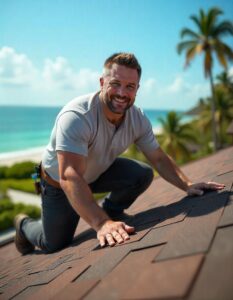 Maintaining your roof in Jacksonville Beach, Florida, is essential for protecting your coastal property against Duval County’s harsh climate. From salt air near the Jacksonville Beach Pier to hurricanes like Hurricane Ian in 2022, your roof faces unique challenges that demand regular care. By following the tips in this guide—inspections, cleaning, repairs, and material-specific maintenance—you can ensure your roof remains durable, efficient, and attractive.
Maintaining your roof in Jacksonville Beach, Florida, is essential for protecting your coastal property against Duval County’s harsh climate. From salt air near the Jacksonville Beach Pier to hurricanes like Hurricane Ian in 2022, your roof faces unique challenges that demand regular care. By following the tips in this guide—inspections, cleaning, repairs, and material-specific maintenance—you can ensure your roof remains durable, efficient, and attractive.
Regular inspections catch issues like corrosion or wind damage early, while cleaning removes salt, algae, and debris, critical for homes in South Jacksonville Beach. Repairs, whether patching leaks or replacing tiles, prevent costly escalation in Florida’s 50+ inches of rainfall. Material-specific care, from asphalt shingles to metal and tile, extends lifespan and enhances performance in 70–90% humidity. Preparing for hurricane season and maintaining reflective roofs further protects your home and saves on cooling costs.
A well-maintained roof boosts property value in Jacksonville Beach’s competitive market, qualifies for insurance discounts, and reduces energy bills. Working with a Jacksonville Beach roofing contractor ensures compliance with Duval County’s 130 mph wind codes and delivers expert care tailored to coastal challenges. At Custom Roofing Solutions, we’re committed to keeping your roof in top shape, offering free inspections and personalized solutions for homes near Oceanfront Park or Ponte Vedra Beach.
Don’t wait for minor issues to become major expenses. Schedule a free roof inspection with our team today to protect your coastal home. Visit our website at https://customroofsolutions.com. With proper maintenance, you can enjoy worry-free living in Jacksonville Beach, knowing your roof is ready for Florida’s toughest conditions.
continue reading
Related Posts
SERVING TAMPA, ST. PETE & ORLANDO
Empowering Your Vision
CENTRAL FLORIDA

CALL TODAY AT (813) 644-2213
Custom Roof Solutions is proud to serve Tampa & Orlando homeowners and businesses with industry-leading roofing and solar services. Whether you need to protect your property from the unpredictable Florida weather or lower your energy costs with solar power, our experienced team is here to provide reliable solutions tailored to your needs.
SERVING JACKSONVILLE AREAS
Empowering Your Vision
NORTH FLORIDA
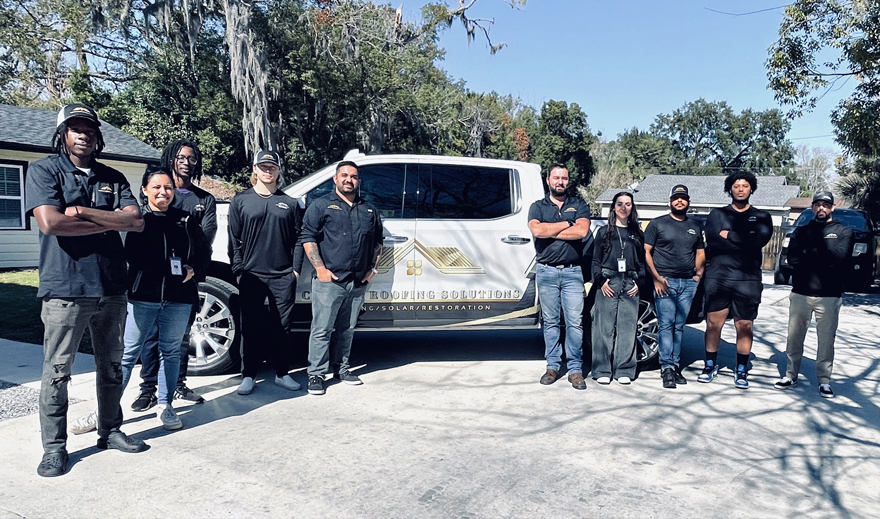
CALL TODAY AT (904) 808-3550
At Custom Roof Solutions, we understand Jacksonville’s unique weather conditions and architectural styles. Whether it’s protecting your home from hurricane-force winds, foof repairs or enhancing its curb appeal with a modern design, our experienced team delivers superior results and ensures long-lasting durability with our premium materials.